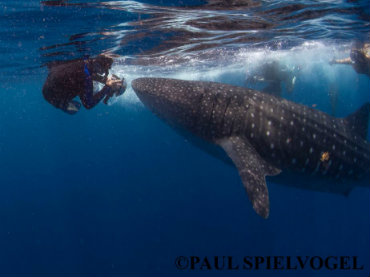- Sections :
- Crime & Public Safety
- Restaurants & Food
- Sports
- More
Categories
Resident shark diver/photographer dives with largest shark species

MONTGOMERY COUNTY, Texas - Shark Week starts today, July 5, on the, Discovery Channel, and Montgomery County’s resident shark authority is nowhere to be found. Woodlands Real Estate Attorney by land, shark diver/photographer by sea, Paul Spielvogel, who usually kicks off the wildly popular, annual Shark Week, is doing what he loves best: diving with sharks. He’s currently in transit from Isla Mujeres where he was shooting the largest of the shark species, whale sharks, with his underwater camera.
Shark Week feature: Paul Spielvogel photographs the enormous whale sharks.
Isla Mujeres is an island in the Caribbean Sea, off the tip of the Yucatán Peninsula coast, just east of Cancun. Traveling with the editor of Shark Diver Magazine, Eli Martinez, the Martinez family, the magazine’s dive team, and Spielvogel’s daughter, Jessie, this trip they dove with Blue sharks, Makos, and the largest of the shark species.
The whale shark is the largest non-cetacean (non-mammal) animal in the world. The average size of an adult whale shark is approximately 30 feet, and weighing 20,000 pounds, although the largest verified specimen was caught November 11, 1947, near Baba Island, off the southwest coast of Karachi, Pakistan. It measured 41.50 ft. long, and weighed approximately 47,000 lb, (according to The Guinness Book of Animal Facts and Feats p. 256. ISBN 978-0-85112-235-9.) Despite their size, the whale shark does not pose a significant danger to humans.
“They’re the ‘gentle giants’ of the shark species,” said Spielvogel in a previous interview.
The whale shark targets concentrations of plankton or fish, not unlike whales, thus their feeding habits and size provides the name combining the two different species. Nonetheless, by virtue of their enormous size, they can appear immensely intimidating. Whale sharks have a mouth that averages five feet wide and contains 300 to 350 rows of tiny teeth.
Given their size, there’s no mistaking the whale shark, but their markings are distinctly different. Not unlike some other sharks, whale sharks are grey with a white belly, but their skin is marked with pale yellow spots and stripes that are unique to each individual shark. This allows shark divers like Spielvogel, scientists, and conservationists, to monitor the species over time. The divers with Shark Diver magazine name sharks on their dives, then look for them on subsequent trips.
The lifespan of a whale shark is estimated at between 70 to 100 years, so it’s likely that Spielvogel and the dive team will see some of the sharks they befriended on previous trips.
“It does appear they seek us out too, when we go back looking for them,” said Spielvogel.
This is not unique to any one species of shark according to Spielvogel. It occurs on diving trips filming other species of shark.
Due to their docile nature, divers often ‘hitch’ rides on the backs of whale sharks, but this is discouraged by Spielvogel and conservationists as it could disturb them. Anything out of the norm of their natural habitat is not recommended.
Like other sharks, whale sharks are ovoviviparous, meaning that the embryos are developed in eggs, but born live, but a little known fact about whale sharks is that they don’t reach sexual maturity until about 30 years of age, and their pups are not born all at once, but produced over a prolonged period of time.
The whale shark is not on the endangered list...yet. It is currently listed as a vulnerable species, because it is still hunted in parts of Asia.
Shark Diver magazine is unique in that it photographs the various species of shark interacting with divers, to validate that humans can co-exist with sharks if we respect them and their environment.
Is this also true of the feared Great White shark? To that Paul Spielvogel replied…
“I have a lot of respect for the Great Whites. I give them a lot of respect.”
Paul Spielvogel will offer himself up as bait once again, for the annual Shark Celebrity Auction to benefit shark conservation. Proceeds will benefit the Shark Research Institute. See page 15 of the Celebrity Auction Catalog.
#SharkDiverMagazine #SharkWeek
Comments •

















